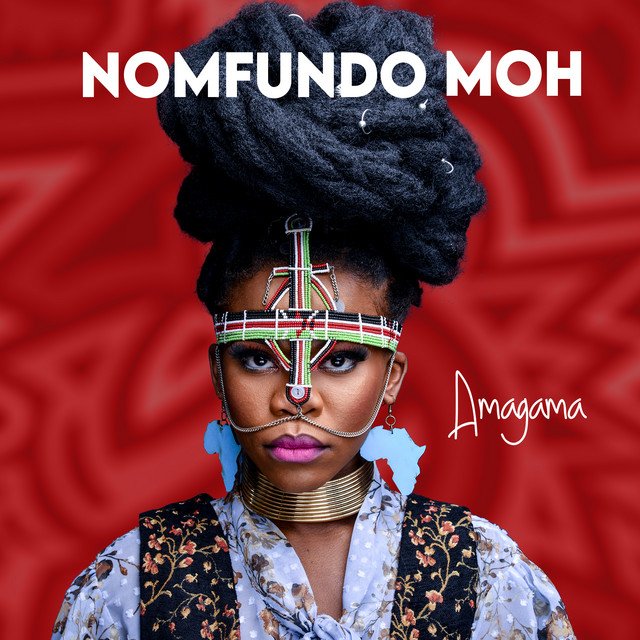Phakade Lami hitmaker Nomfundo Moh explores self in debut album
Amagama album art
With the release of her first album Amagama, the 21-year-old recently qualified social worker guarantees herself a place among the best in the genre of Afro-Pop. Nomfundo Moh’s ascendance to renown finds her contemplating spirituality, and her music makes apt connections. The album opener, Revelation sees the songwriter sound above distant harmonies and hushed percussion a Nguni (Bantu languages spoken in Southern African countries by Nguni people’s) incantation to the ancestors, “Thonga lami ngihawukele” ("Have mercy upon me, my ancestors"). Measured and contemplated, the debutante lists the song first, as she pleads to the omniscient for mercy. Similarly, the eponymous outro hints at the same intentionality and need for spirituality; on Amagama, she sings epithets of gratitude, declaring, “Ngibonga abakithi asebalala/ Makukhanye bantu abadala (I thank the elders who have died/ May light shine)”.
Conceived during the gruelling, if delightful for creativity, lockdown period, Amagama is a 13-track sonic odyssey into faith and figuring. Here, the songstress carefully captures a consuming early adulthood angst, albeit girded by an abiding faith. The record finds Nomfundo Moh oscillating between collapse and gratitude to longing to resignation, and then some. The explorations are complex, and the complexities interwoven.
On the pop ballad, Umthwalo, she persuades the listener with enthralling storytelling, “Lalela, lalela (Listen, listen),” she opens. The song chronicles the tentative beginning of a career. Her narration, “Hay’uyasinda umthwalo wam’ (Oh my struggle is heavy),” offers an introduction into her lucid song writing. In the first verse, she scrutinises her life; she is most concerned with what her career would look like had she different experiences marred by not struggle. Nomfundo Moh postulates and imagines herself less refined in the absence of life-altering pain. The second verse finds her present, returned from the alluring dreamscape to the haunting reality in which her dreams remain unrealised. Unable to resist temptation, she continues to catalogue the ways in which her pain overcomes her: “Ib’hlungu inhliziyo yami/Nasebusuku angisalali/Ngiyayizama impilo akulungi (My heart is sore/ I don’t even sleep at night/ I am trying life unsuccessfully)”.
Many of her songs contemplate her life pre-emptively, and here in this life she has carved, she is a superstar. Umona takes the quintessential pop-star’s stance and addresses the so-called haters, while Nginjena is a defiant, uncompromising pride at who she is. Emanating from this trove is an uncompromising search for truth and meaning into a defined measure of life, and Soft Life is aware of this.
By contrast, Lilizela boosts Moh over an optimistic percussive arrangement. We find the artist singing glorious praises, “Umukhulu wena/ Onqob’inhliziyo yam’/ Uphakeme wena” (Great one/ He who conquers my heart/ Exalted one). The song sees the musician make ethereal proclamations reminiscent of a gospel that is cognisant of love of the romantic kind. On the chorus, she melodically ululates with thanks to a lover who is never named.
Elsewhere, the record finds its alchemy in its generous expressions of love. Moh’s biggest song features culture mainstays, Ami Faku and Sha Sha. The trio croon over sustained strings and heavy pop drum work to sing about a missing love in Xhosa and Zulu and then Shona. Perhaps Phakade Lami serves to stand as testament to the artist’s staying power, and even as remedy to the songs she sings about. Here, she manages to keep the song hers, not allowing herself to be overpowered by these musicians of uncommon genius. Phakade Lami sees Moh at her most inspired and felicitous. She recently received her double platinum plaque for the song.
Ngam’khetha is a poem about a chosen one. On Apple Music, the singer tells, “It’s more like a wedding song, that’s how I would describe it. Whenever I listen to it, even the way I wrote it, it creates those images of a bride walking down the aisle. Like, ‘I chose my lover out of a lot of people who were promising me heaven and earth. But this is the one’”. She teams up with NaXion-Cross (he produces the album) who serenades in a lower octave away from Moh’s soprano, creating an amenity that balances things out. Rapper Beast (RSA) offers a welcome break with soul-stirring musings that epitomise an ode to back-to-basics love letters.
Amagama sets Nomfundo Moh above productions that are deeply rooted in Zulu culture and its influences, a voice that is perceivably capable of churning out bigger notes, and song writing that transcribes the heart on paper. Nomfundo Moh skilfully composes herself to luminary, bolstering along the way an immeasurable self-belief and confidence – in herself and the transcendental beings to whom she prays.
Stream Amagama via Apple Music or Spotify
Written by Thembi Ngubo

